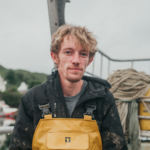The Scottish Government’s upcoming Call for Evidence on Inshore Fisheries Management presents a crucial opportunity to address long-standing challenges in Scotland’s inshore waters. Members of the Our Seas Coalition, an alliance of over 140 coastal businesses, recreational interests, community groups and environmental organisations, are urging the Government to create a system that balances economic resilience, local decision-making, and environmental stewardship. The Our Seas coalition, whose membership includes the Scottish Creel Fishermen’s Federation, small fishing businesses and sea angling bodies, are united in support for the reinstatement of a modern version of the limit on inshore bottom-trawling that used to safeguard inshore fisheries and fish stocks up until 1984. Members of the coalition see this consultation as a chance to shape a future where thriving inshore fisheries benefit coastal communities, marine biodiversity, and future generations alike.

Ian McWhinney
Shellfish Safaris & Chair of Gairloch Creel Fishermen’s Association
Willie Kennedy
Scottish Sea Angling Conservation Network & Scottish Federation of Sea Anglers
Haydn MacKenzie
creel fisherman, member of Scottish Creel Fishermen’s FederationThe Call for Evidence on the state of Scotland’s inshore fisheries management is open until 18 Feb 2025. Have your say here.
Leave a Reply